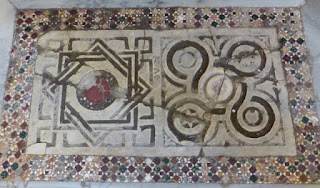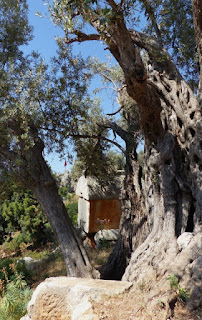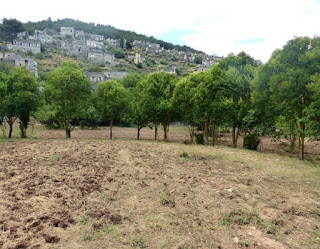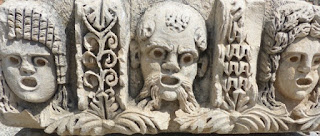One of the first
things you notice about Turkish towns is the number of small businesses that
seem to exist, if not, thrive.
There are, for example, more barbershops than one can believe could be
viable; there are countless choices for men. In the importance given to
grooming, and in so many other ways, Turkey and Greece are similar.
Surprisingly, as
you may think, I regularly get a haircut and beard trim. Barbers are highly
professional and a haircut is a luxurious moment of indulgence. On the day we
left the town of Fethiye in Turkey I decided to get rid of the homeless person
look and found a small shop in the back streets with no tourists, and agreed a
price. As I sat down I realized that one of the barbers was having a kip, sprawled
across a chair; his snores, unembarrassed, reverberated around the small room.
I was empathetic; in a barber’ chair I always drift off a bit too…
As I sat there in
my semi conscious state, despite the Edward Scissor Hands flash of snipping
around my head, I was set to thinking about the region we have been traveling
in for the past three weeks or so, images and thoughts chaotically filling my
head.
Known still as
Lycia this area was inhabited some 5 000 years ago when the foundations for an
extraordinary civilization were born and recorded in cuneiform. Lycians have
been important in power struggles in this part of the world since then and were
part of the formation of present day Turkey. They were a powerful civilization
that predated and rivaled that of the Greeks, Romans and Ottomans. They conquered
and were conquered by, or made alliances with, every power that the
Mediterranean has seen and thus left their mark on European culture. Their
architecture can still be seen today. The Roman sarcophagus is derived from the
Lycian and the pedimented Greek style of building is seen on their earliest tombs.
Sitting in my
chair, my head being firmly adjusted at intervals, I saw in the people around
me the heirs to those very Lycians with their influences of East and West that
make Turkey so fascinating for us.
As a piece of
sagging flesh was tugged aside to facilitate a better cutting angle, I
reflected on the town of Kayakoi that we had visited a couple of days before.
Once occupied by
both Greeks and Turks it is now a desolate collection of ruins as a result of
the 1922 population swap between Turkey and Greece. 1.2 million Greeks and 400
thousand Turks. (It was reminiscent of the current exodus from Syria of a
similar number of people). The vast majority of the inhabitants of Kayakoi, an
important town at the time, were Greek and after their departure, the town was
never occupied again.
The experience of
walking around the deserted village is emotionally charged and sharpened by
images of the Greek family whose house was now converted into a restaurant. The
abandoned family photographs speak of the haste in which the family had
departed. The hearths that families gathered around for generations, the paths
and steps that were constructed by communal effort with stones worn smooth by
thousands of feet remind me of what a dreadful wrench it must have been for
these people to desert their homes, friends, sacred places; the accumulation of
centuries of human collaboration. The tourist notice disingenuously claims that
‘… some people moved voluntarily but no violence or hurt was suffered.’
There are about
three thousand houses clustered on the side of the steep hill yet every house
retains its view. The materials of construction are universally stone and wood
yet they each have a uniqueness that gives them individuality and the town its
character. The stone remains but the timber lintels and roof beams have been
pilfered. Each house is about 50 square metres. A multi cultural, egalitarian society, respectful of neighbours, reduced to ruin for dubious political reasons. It has always been so and it still is.
Without warning a
flaming wad of cotton wool sweeps across my ears, singing the errant hairs! My
God! No more dozing! No hair in my ears or nostrils escapes the man’s
attention!
And then the
wonderful shoulder massage that is part of every haircut. Mmm… here we go
again!
And some more pics....
 |
| Ancient glass in the excellent Antalya museum |
 |
| Details of Roman corinthian capitals and friezes from ancient Mira |
 |
| Mosaic floor of the Church of St Nicholas, Demra (Ancient Mira) |
 |
| Rural Turkish house with clay tiled roof, originally clay in the same manner as our own "Brakdak" |






























No comments:
Post a Comment